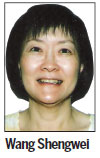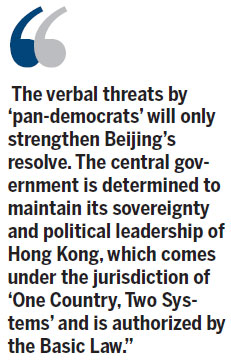Sun Tzu's wisdom offers lessons for Hong Kong
Updated: 2014-09-08 07:30
By Wang Shengwei(HK Edition)
|
|||||||||

The National People's Congress Standing Committee (NPCSC) unveiled a long-awaited reform framework on Aug 31. This outlines arrangements for the election of the Chief Executive (CE) via universal suffrage (which can start from the year 2017), and for 2016 Legislative Council (LegCo) members.
It includes the formation of a broadly based Nomination Committee (NC) of 1,200 members, which consists of four sectors and their respective subsectors, and the selection of two to three candidates who have succeeded in securing a minimum of 50 percent support from the NC. It does not allow for the possibility of public nomination.
Heated discussions and debates in Hong Kong have gone on all summer.
Huge turnouts of "Occupy Central" and anti-"Occupy" supporters in street rallies dominated daily newspaper headlines. It is no surprise that people have different views on this framework.
Its impact on Hong Kong may last a long time, especially when the "pan-democrats" are still mobilizing their supporters to undertake the "Occupy" campaign. But the verbal threats by "pan-democrats" will only strengthen Beijing's resolve. The central government is determined to maintain its sovereignty and political leadership of Hong Kong, which comes under the jurisdiction of "One Country, Two Systems" and is authorized by the Basic Law.
Will the "Occupy" campaign make any difference? And how long will they continue with their protests? Until 2047? The future of the SAR after 2047 has never been publicly discussed. So wouldn't it be wise for the opposition LegCo members to cooperate and support the reform package for the benefit of Hong Kong people? If by next July at the latest, the reform package has not been backed by two-thirds of LegCo members, then Hong Kong will continue using the old method for electing the CE. How will this benefit the "pan-democrats"?
High property prices and inadequate infrastructure are serious threats to Hong Kong's competitiveness. But "Occupy" has created another major challenge for Hong Kong. So it is time the supporters of both "Occupy" and anti-"Occupy" campaigns calmed down. They need to repair the damage done to Hong Kong before international organizations start lowering their ratings for the city.
The power struggle between the "pan-democrats" and Beijing is over - even if LegCo does not ultimately vote the reform package into law. There is sufficient legal support in Hong Kong for Beijing's decision based on a sound understanding of international law and the Basic Law.

The only criticism, raised by Beijing academic Chen Duanhong, may be the lack of representatives in certain sectors, who have a voice in helping select 2017 CE candidates.
The current NC comprises approximately 1,200 members. It is selected by constituencies generally establishment-leaning and by the city's business elite.
Li Fei, the legislative official, said that the existing NC was already "broadly representative" of the Hong Kong electorate. This will provide the right base for the NC in future elections. This assertion has been roundly rejected by the "pan-democrats".
So how is it possible to redress this "unreasonable" imbalance in the NC?
This challenge may actually open the door for the opposition to negotiate with Beijing. They could discuss ways to "re-balance" the political landscape. To do this, the "pan-democrats" must take incremental steps and recognize political reality. If Beijing agrees, the moderate "pan-democrats" may then vote for the reform package in exchange for gaining more "pro-democrat seats" in the NC.
Both Beijing and the "pan-democrats" should consider this possibility. They should also consider politics as an art. The art of compromise is "agree to disagree" which is the essence of true democracy.
For the Chinese, this brings to mind the teachings of the great strategist, Sun Tzu, who once said:
"The highest form of leadership is to stop the enemy's plans. The next best thing is to prevent the merger of the enemy's forces; the next is to attack the enemy's army in the field. But the worst policy of all is to lay siege to walled cities."
"Occupy" supporters should heed these wise teachings and think of a new way forward.
The author is an independent scholar and freelance writer. She is also the founder and president of the China-US Friendship Exchange, Inc.
(HK Edition 09/08/2014 page7)